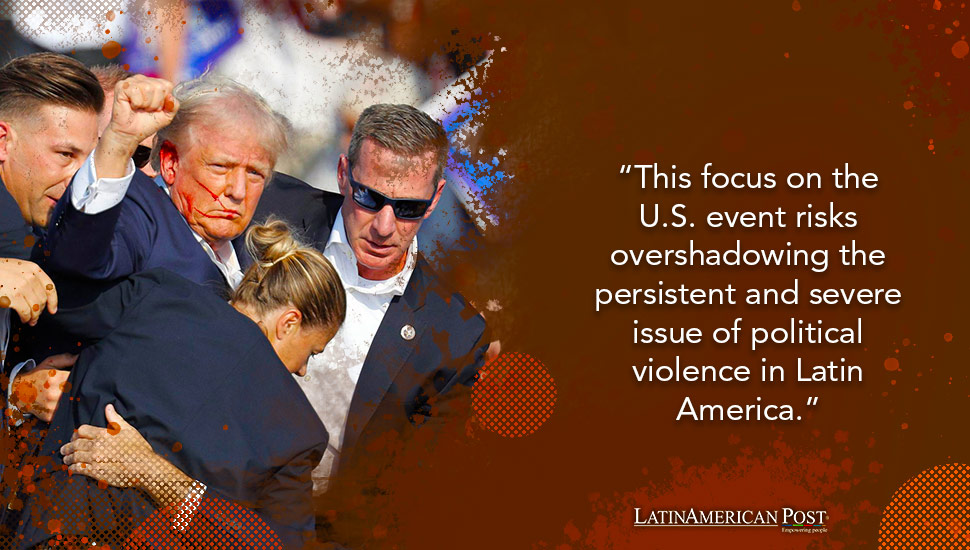Political Violence in Latin America Cannot be Overshadowed by High-Profile Attack in the U.S.

The recent attack on Donald Trump at a Pennsylvania rally has garnered global condemnation and extensive media coverage. However, this focus on the U.S. event risks overshadowing the persistent and severe issue of political violence in Latin America.
World leaders have rapidly condemned Saturday’s attack on Donald Trump at a rally in Pennsylvania, where the former president was shot in the ear. Expressing shock, they denounced political violence and wished him a quick recovery. The Trump campaign later assured the public that Trump, who is running again for the White House in the upcoming U.S. election, was “doing well.” The FBI identified 20-year-old Thomas Matthew Crooks of Bethel Park, Pennsylvania, as the “subject involved” in what they termed an attempted assassination.
A spokesperson for United Nations Secretary-General Antonio Guterres condemned the shooting, calling it an “act of political violence.” Leaders worldwide, including Japanese Prime Minister Fumio Kishida and British Prime Minister Keir Starmer, expressed their dismay and emphasized the importance of standing against violence that challenges democracy.
The shooting has drawn reactions from leaders worldwide, highlighting a united front against political violence. Ukrainian President Volodymyr Zelenskiy, relieved that Trump was safe, reiterated that there was “no justification” for such violence. Australian Prime Minister Anthony Albanese described the incident as “concerning and confronting,” while Canadian Prime Minister Justin Trudeau said it left him “sickened.” French President Emmanuel Macron called the shooting “a tragedy for our democracies,” reflecting the shared shock and indignation felt globally.
Israeli Prime Minister Benjamin Netanyahu and Hungarian Prime Minister Viktor Orban, who recently met Trump during a visit to the U.S. for a NATO summit, also expressed their prayers and support. Brazilian President Luiz Inacio Lula da Silva condemned the attack, urging others to do the same and calling it “unacceptable.”
Latin America’s Enduring Struggle with Political Violence
While the attack on Trump has captured international attention, it is crucial to recognize that political violence is a persistent and severe issue in Latin America. Just recently, a court in Ecuador handed down prison sentences for five individuals found guilty of murdering presidential candidate Fernando Villavicencio. The journalist and former legislator was shot while leaving a rally in August 2023, becoming a prominent victim of Ecuador’s escalating violence.
Prosecutors accused at least two of those tried of belonging to the Los Lobos crime gang, designated as terrorists by President Daniel Noboa. According to the attorney general’s office, Carlos Edwin Angulo Lara, known as ‘El Invisible,’ orchestrated the murder from prison, while Laura Dayanara Castillo managed logistics. Both were sentenced to 34 years and eight months, with others receiving 12-year sentences.
Villavicencio’s murder highlights the dangerous intersection of organized crime and politics in Latin America. His journalism exposed corruption and connections between criminal gangs and politicians, leading to long-standing threats against his life. The region continues to grapple with high-profile assassinations and systemic violence that undermine democracy and stability.
A Broader Perspective on Political Violence
The international community’s swift condemnation of the attack on Trump underscores the universal rejection of political violence. However, it is essential to maintain a balanced perspective and not let this singular event overshadow the broader and ongoing issues other regions face. Latin America’s struggle with political violence, corruption, and organized crime requires sustained attention and action.
Ecuador is not alone in facing these challenges. Across Latin America, from Brazil to Mexico, political figures, activists, and journalists routinely face threats and violence. The murder of Villavicencio is part of a disturbing pattern that demands a comprehensive response from both regional governments and the international community.
In Mexico, political violence has reached alarming levels, with numerous candidates and officials targeted by criminal organizations. The country’s recent elections were marred by a series of assassinations, highlighting the dangerous environment in which public servants operate. Similarly, Brazil has witnessed significant political violence, often linked to land disputes and criminal activities.
Addressing the Root Causes
To effectively combat political violence, it is crucial to address the root causes, including corruption, impunity, and the pervasive influence of organized crime. Strengthening institutions, promoting transparency, and ensuring justice for victims are essential steps in creating a safer environment for political participation.
International support and cooperation can play a vital role in these efforts. By providing resources, expertise, and diplomatic pressure, global partners can help Latin American countries build resilient, democratic institutions and reduce the prevalence of political violence. Initiatives to improve law enforcement capabilities, judicial independence, and community engagement are vital components of a comprehensive strategy.
Moreover, media coverage and public discourse should reflect the severity of political violence in Latin America. While high-profile attacks like the one on Trump deserve attention, it is equally important to highlight the ongoing struggles faced by individuals and communities in regions plagued by systemic violence. Balanced reporting can raise awareness and galvanize support for meaningful change.
A Call for Balanced Attention
The attack on Donald Trump has rightly drawn global condemnation and highlighted the importance of combating political violence. However, this event should not overshadow the persistent and severe issue of political violence in Latin America. The recent sentencing in Ecuador for the murder of Fernando Villavicencio serves as a stark reminder of the dangers faced by political figures in the region.
Also read: Panama and U.S. Plan to Curb Migration Through Darien Jungle Faces Doubts
As the world stands united against political violence, it is imperative to maintain a balanced perspective and ensure that all regions’ struggles receive the attention and action they deserve. By addressing the root causes and fostering international cooperation, we can work towards a future where political participation is safe and democratic institutions are robust.





